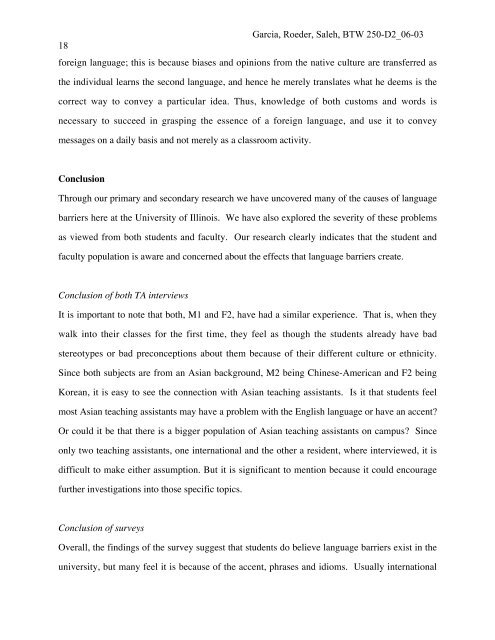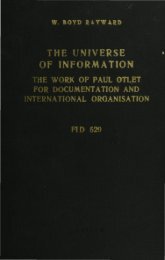Language Barriers in the University of Illinois Urbana ... - ideals
Language Barriers in the University of Illinois Urbana ... - ideals
Language Barriers in the University of Illinois Urbana ... - ideals
You also want an ePaper? Increase the reach of your titles
YUMPU automatically turns print PDFs into web optimized ePapers that Google loves.
Garcia, Roeder, Saleh, BTW 250-D2_06-03<br />
18<br />
foreign language; this is because biases and op<strong>in</strong>ions from <strong>the</strong> native culture are transferred as<br />
<strong>the</strong> <strong>in</strong>dividual learns <strong>the</strong> second language, and hence he merely translates what he deems is <strong>the</strong><br />
correct way to convey a particular idea. Thus, knowledge <strong>of</strong> both customs and words is<br />
necessary to succeed <strong>in</strong> grasp<strong>in</strong>g <strong>the</strong> essence <strong>of</strong> a foreign language, and use it to convey<br />
messages on a daily basis and not merely as a classroom activity.<br />
Conclusion<br />
Through our primary and secondary research we have uncovered many <strong>of</strong> <strong>the</strong> causes <strong>of</strong> language<br />
barriers here at <strong>the</strong> <strong>University</strong> <strong>of</strong> Ill<strong>in</strong>ois. We have also explored <strong>the</strong> severity <strong>of</strong> <strong>the</strong>se problems<br />
as viewed from both students and faculty. Our research clearly <strong>in</strong>dicates that <strong>the</strong> student and<br />
faculty population is aware and concerned about <strong>the</strong> effects that language barriers create.<br />
Conclusion <strong>of</strong> both TA <strong>in</strong>terviews<br />
It is important to note that both, M1 and F2, have had a similar experience. That is, when <strong>the</strong>y<br />
walk <strong>in</strong>to <strong>the</strong>ir classes for <strong>the</strong> first time, <strong>the</strong>y feel as though <strong>the</strong> students already have bad<br />
stereotypes or bad preconceptions about <strong>the</strong>m because <strong>of</strong> <strong>the</strong>ir different culture or ethnicity.<br />
S<strong>in</strong>ce both subjects are from an Asian background, M2 be<strong>in</strong>g Ch<strong>in</strong>ese-American and F2 be<strong>in</strong>g<br />
Korean, it is easy to see <strong>the</strong> connection with Asian teach<strong>in</strong>g assistants. Is it that students feel<br />
most Asian teach<strong>in</strong>g assistants may have a problem with <strong>the</strong> English language or have an accent?<br />
Or could it be that <strong>the</strong>re is a bigger population <strong>of</strong> Asian teach<strong>in</strong>g assistants on campus? S<strong>in</strong>ce<br />
only two teach<strong>in</strong>g assistants, one <strong>in</strong>ternational and <strong>the</strong> o<strong>the</strong>r a resident, where <strong>in</strong>terviewed, it is<br />
difficult to make ei<strong>the</strong>r assumption. But it is significant to mention because it could encourage<br />
fur<strong>the</strong>r <strong>in</strong>vestigations <strong>in</strong>to those specific topics.<br />
Conclusion <strong>of</strong> surveys<br />
Overall, <strong>the</strong> f<strong>in</strong>d<strong>in</strong>gs <strong>of</strong> <strong>the</strong> survey suggest that students do believe language barriers exist <strong>in</strong> <strong>the</strong><br />
university, but many feel it is because <strong>of</strong> <strong>the</strong> accent, phrases and idioms. Usually <strong>in</strong>ternational
















